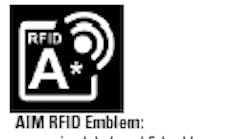Despite some news reports that a proposed New Hampshire law [HB-203 FN 2005, amendment to RSA 358-A:2] protects people from being surreptitiously injected with radio-frequency identification (RFID) tags—insert spooky SciFi music here—the proposed law simply requires customer notification that an item contains a tracking device. It would require that "the seller, prior to the sale, inform the consumer verbally or in writing of the existence of the device."
Sounds reasonable enough. Except, in the words of the proposed act, "'device' means any item or application that is capable of providing the physical location or tracking the movement of the goods."
That definition would cover EPC tags on shipping containers or products. If you ship product that is sold by the case or in its shipping unit, the seller would have to inform the customer that the tag is there. This assumes the seller (or salesclerk) knows about the presence of the tag.
It's interesting that the proposed amendment is to be added to existing legislation for "Regulation of Business Practices for Consumer Protection" that includes a litany of deceptive and unfair trade practices. The law [358-A:2] says "It shall be unlawful for any person to use any unfair method of competition or any unfair or deceptive act or practice in the conduct of any trade or commerce within this state."
How, exactly, the use of RFID can be construed under deceptive trade practices is a bit questionable. But the hidden-hazard of the proposed act is that it's vague. There is no definition of " adequate" notification. And where there's doubt there will be legal action.
The current proposed amendment leaves open to interpretation what measures will be considered adequate to inform the customer of the presence of the tag. Will a sign advising customers that some products have RFID tags on the carton be sufficient? Will all sales clerks be required to scrutinize every item for an RFID tag and verbally inform the customer of its presence? If so, how will they know? What wording would be considered proper? Will we need printed cards explaining all of this to be handed out at the register? Will customers be required to sign an affidavit acknowledging they have been adequately informed— every time?
Stretching the bounds of common sense (but not of probability), will manufacturers and distributors be considered the "seller" and held liable if a customer is not "adequately" informed? (After all, your company may have "deeper pockets" than the actual seller and, in the case of litigation, lawyers go for pockets that have more than lint in them.) The seller could claim that you failed to inform him of the presence of an RFID tag and he, therefore, could not inform the customer. (Does this sound like it has the potential to get messy? You bet.)
One way you can help protect yourself is to ensure that your customers do know about the presence of an RFID tag (EPC or otherwise) on all of your products and shipping units. You can start by printing either the EPC Seal (for EPC-compliant applications) or the AIM RFID Emblem on all of your RFID tags and labels. Both of these symbols are visual signs that indicate the presence of an RFID tag. You then need to educate your customers about the meaning of the symbols.
You also need to monitor proposed RFID legislation—in your own state as well as those to which you ship product— and work with state legislators to prevent irrational regulation and vague wording in any proposed law.
RFID-In-Use Logos




